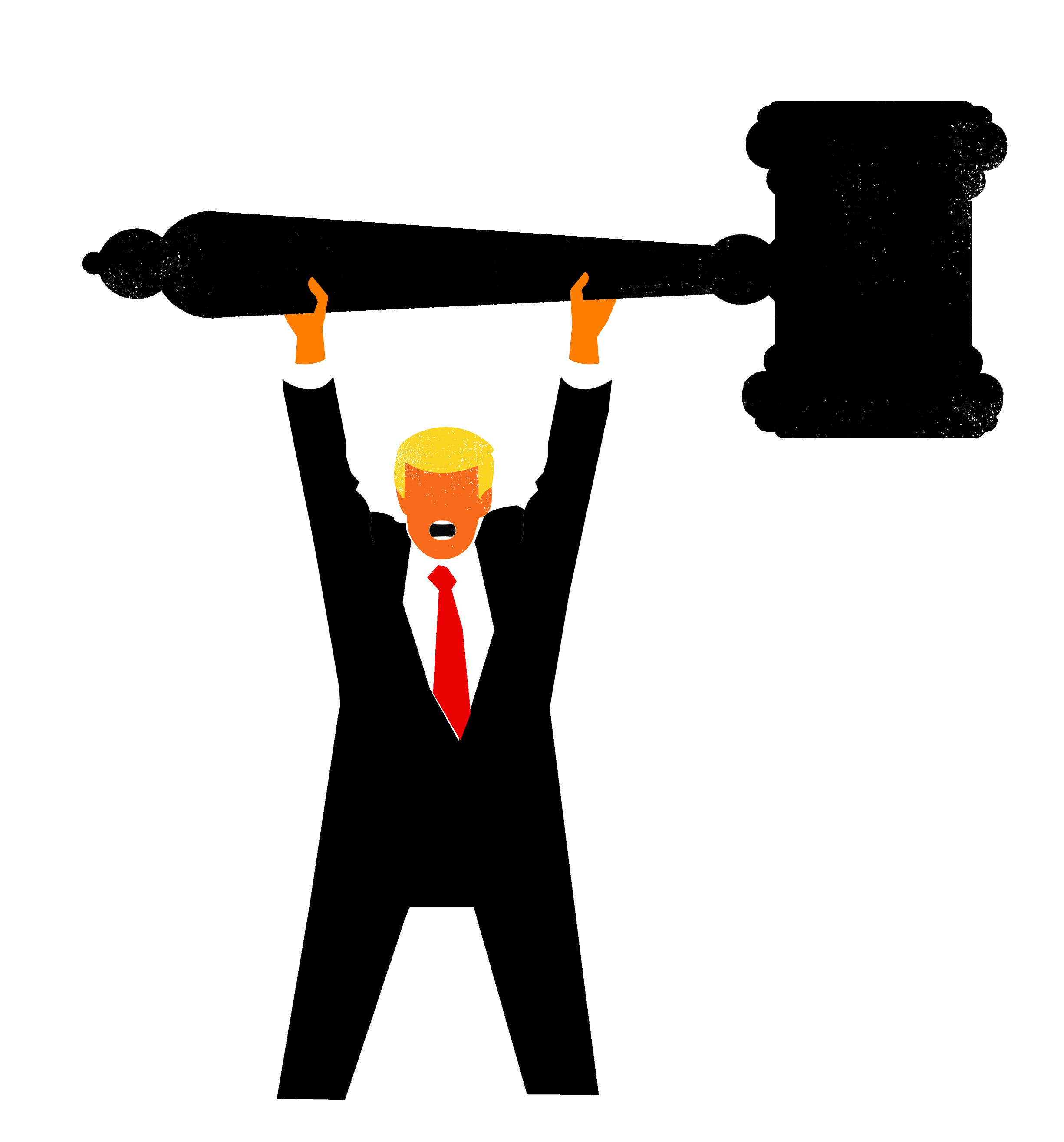Both critics and supporters of President Trump agree that, to date, the most important consequence of his presidency and sustained Republican control of the Senate has been the significant change in the federal judiciary. As of April 1, a record 39 judges have been appointed to lifetime posts on the Supreme Court and the federal courts of appeals. Right-wing organizations like the Federalist Society and the Heritage Foundation have played an important role too, including spending millions of dollars promoting Trump’s judicial nominations, and they are clearly getting a good return on their investment. In fewer than two years, narrow-minded, elitist Trump appointees have already done harm to women, workers, consumers, voters, immigrants, and many additional constituencies. These nominees have developed a clear pattern of protecting corporations, the wealthy, and the powerful over all people.
Let’s start with the Supreme Court. Trump’s Justice Neil Gorsuch was the deciding vote last year in more than a dozen decisions that, among other damage, upheld the Trump ban on travel from Muslim countries; ruled that 100,000 service advisers who work for auto dealerships are not entitled to overtime pay; approved Ohio’s purge of more than a million voters from the rolls; and reversed a decades-old precedent that protected workers’ rights to organize. Gorsuch and fellow Trump appointee Justice Brett Kavanaugh have cast deciding votes in 5–4 rulings this year that approved indefinite detention of some legal immigrants, put into place Trump’s military transgender ban, and authorized the immediate execution of a prisoner before a lower court could even consider his religious discrimination claim. Many more 5–4 decisions are expected this year and next, on subjects such as reproductive rights, religious liberty, and discrimination, on which Kavanaugh and Gorsuch are likely to continue to play their decisive role.
But nearly as important, and far less reported, is the profound impact Trump and his administration have had on the courts just a tier below the Supreme Court—the federal courts of appeals.
These courts, which usually decide cases in panels of three judges, serve as the Supreme Court for most Americans, since they review 50,000 cases a year, while the High Court considers fewer than 100. Trump has already appointed more than one out of every five appellate court judges in the country, and many of their opinions share a cramped view of people’s rights and a willingness to distort or overturn precedent.
Trump’s appellate judges have already cast deciding votes, for example, to dismiss citizens’ group petitions to review air pollution permits, without even reviewing the merits of their claims (Trump judge Joan Larsen); to prevent an age-bias case from going to a jury (Trump judge John Bush); to give Trump the power to fire the head of an independent housing finance agency set up by Congress (Trump judge Don Willett); and to uphold the denial of a visa to the wife of a U.S. citizen, despite a Reagan-appointed judge’s strong dissent (Trump judge and much-rumored Supreme Court short-lister Amy Coney Barrett).
Trump appellate judges have also had a strong influence in the rare but important cases where all the judges on a federal circuit decide a case together. In one such case, Trump judge Amy Coney Barrett voted to allow a corporation to racially segregate its workplaces. In other cases, Trump appellate judges have cast deciding votes to reverse a prior ruling and uphold Ohio’s law barring funding to Planned Parenthood for health care because it provides abortions with non-state funds (Trump judges Thapar, Larsen, Bush, and Nalbandian); to rule that older workers cannot claim that an employer’s hiring practices have a discriminatory impact on them, despite federal legal protections (Trump judges Barrett, Brennan, Scudder, and St. Eve); and to allow a devastating Louisiana anti-choice law to take effect, a decision that was temporarily reversed by a 5–4 Supreme Court vote in which Gorsuch and Kavanaugh dissented (Trump judges Willett, Ho, Engelhardt, and Oldham).
In fact, in cases where they did not have enough votes to form a majority, Trump justices and appeals court judges have made clear in dissents that, with more support, they would do even further harm to Americans’ rights in voting, religious liberty, privacy, LGBTQ concerns, money in politics, gun safety, and more. For example, Trump judge Amul Thapar tried in one dissent to make it easier for employers to get away with sex discrimination. Trump judge Stephanos Bibas tried to strike down a New Jersey law banning rapid-fire ammunition used by assault weapons. And Trump judge Kevin Newsom urged the overruling of long-established court precedent that prevents the government from endorsing religion. With more Trump appointments to the courts of appeals and the Supreme Court, such dissents could become the law of the land.
With the 2020 elections 18 months away, it is crucial that Democratic and independent voters take action on federal judicial nominations. This includes holding Republican senators accountable for their votes to confirm Trump nominees, as well as urging all senators to reject more Trump appointments. There can be no doubt that a continuing Trump takeover of the federal judiciary will powerfully motivate conservatives to reelect Trump and a Republican Senate in 2020. Democrats and independents must be even more committed to voting for presidential and senatorial candidates who will support the appointment of fair-minded constitutionalists to lifetime federal judicial appointments, not the narrow-minded elitists nominated by Trump and approved by the Republican Senate.
Elliot Mincberg is a senior fellow at People for the American Way.







0 Comments